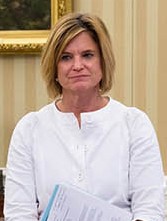A Quote by Seamus Heaney
A public expectation, it has to be said, not of poetry as such but of political positions variously approvable by mutually disapproving groups.
Quote Topics
Related Quotes
If you'd asked me some years ago, I would have said [Dalai Lama] is an extraordinarily compassionate, clear-sighted, calm human being. But now, I'm more convinced than ever that his political positions as well as his spiritual positions arise out of such precise and realistic thinking that they're extremely sound.
There's no difference between lyrics and poetry. Words are words. The only difference is the people who are in academic positions and call themselves poets and have an academic stance. They've got something to lose if they say it's all poetry; if there's not music to it, and you have to wear a certain kind of checkered shirt or something like that. It's all the same. Lyrics are lyrics, poetry is poetry, lyrics are poetry, and poetry is lyrics. They are interchangeable to me.
My feeling is that most political poetry is preaching to the choir, and that the people who are going to make the political changes in our lives are not the people who read poetry, unfortunately. Poetry not specifically aimed at political revolution, though, is beneficial in moving people toward that kind of action, as well as other kinds of action. A good poem makes me want to be active on as many fronts as possible.
In the States, there has been, compared to the Sixties and Seventies, a huge retrenchment - not just in poetry - into the personal. A withdrawal from thinking in terms of social and collective values, needs and solutions. The consciousness-raising groups of the women's movement, for instance, becoming "support-groups" or therapy groups.
Horizontal hostility may be expressed in sibling rivalry or in competitive dueling which wrecks not only office tranquility or suburban domesticity but also some radical political groups and, it must be sadly said, some women's liberation groups. ... [it is] misdirected anger that rightly should be focused on the external causes of oppression.
If you look back at history or you look at any place in the world where religious groups or ethnic groups or racial groups or political groups are killing each other, or families have been feuding for years and years, you can see - because you're not particularly invested in that particular argument - that there will never be peace until somebody softens what is rigid in their heart.
There's a sameness about American poetry that I don't
think represents the whole people. It represents a poetry
of the moment, a poetry of evasion, and I have problems
with this. I believe poetry has always been political, long
before poets had to deal with the page and white
space . . . it's natural.







































